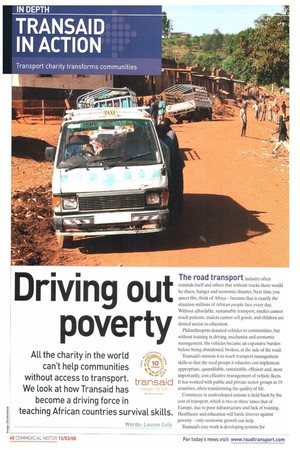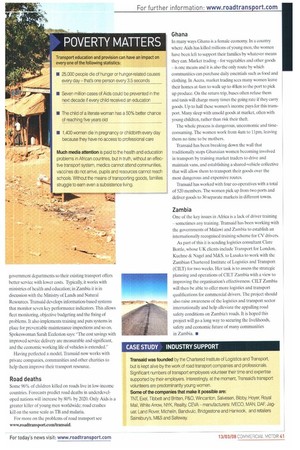riving out poverty
Page 40

Page 41

If you've noticed an error in this article please click here to report it so we can fix it.
All the charity in the world can't help communities without access to transport. We look at how Transaid has become a driving force in teaching African countries survival skills.
_,Nooribe,
10.‘"e. A EARjR
R
air:: 4:00
transaid
,
The road transport industry often reminds itself and others that without trucks there would be chaos, hunger and economic disaster. Next time you assert this, think of Africa — because that is exactly the situation millions of African people face every day. Without affordable, sustainable transport, medics cannot reach patients, traders cannot sell goods, and children are denied access to education.
Philanthropists donated vehicles to communities, but without training in driving, mechanics and economic management, the vehicles became an expensive burden before being abandoned, broken, at the side of the road.
Transaid's mission is to teach transport management skills so that the seed groups it educates can implement appropriate, quantifiable, sustainable, efficient and, most importantly, cost-effective management of vehicle fleets. It has worked with public and private sector groups in 19 countries, often transforming the quality of life.
commerce in undeveloped nations is held back by the cost of transport, which is two or three times that of Europe, due to poor infrastructure and lack of training. Healthcare and education will battle forever against poverty — only economic growth can help.
Transaid's core work is developing systems for government departments so their existing transport offers better service with lower costs. Typically, it works with ministries of health and education; in Zambia it is in discussion with the Ministry of Lands and Natural Resources. Transaid develops information-based systems that monitor seven key performance indicators. This allows fleet monitoring, objective budgeting and the fixing of problems. It also implements training and puts systems in place for preventable maintenance inspections and so on. Spokeswoman Sarah Eccleston says: "The cost savings with improved service delivery are measurable and significant, and the economic working life of vehicles is extended."
Having perfected a model, Transaid now works with private companies, communities and other charities to help them improve their transport resource.
Road deaths Some 960/ of children killed on roads live in low-income countries. Forecasts predict road deaths in underdeveloped nations will increase by 80% by 2020. Only Aids is a greater killer of young men worldwide; road crashes kill on the same scale as TB and malaria.
For more on the problems of road transport see www.roadtransport.com/transaid.
Ghana
In many ways Ghana is a female economy. In a country where Aids has killed millions of young men, the women have been left to support their families by whatever means they can. Market trading — for vegetables and other goods — is one means and it is also the only route by which communities can purchase daily essentials such as food and clothing. In Accra, market trading sees many women leave their homes at 4am to walk up to 40km to the port to pick up produce. On the return trip, buses often refuse them and taxis will charge many times the going rate if they carry goods. Up to half these women's income pays for this transport. Many sleep with unsold goods at market, often with young children, rather than risk their theft.
The whole process is dangerous, uneconomic and timeconsuming. The women work from 4am to llpm, leaving them no time to be mothers.
Transaid has been breaking down the wall that traditionally stops Ghanaian women becoming involved in transport by training market traders to drive and maintain vans, and establishing a shared-vehicle collective that will allow them to transport their goods over the most dangerous and expensive routes.
Transaid has worked with four co-operatives with a total of 520 members. The women pick up from two ports and deliver goods to 30 separate markets in different towns.
Zambia
One of the key issues in Africa is a lack of driver training — sometimes any training. Transaid has been working with the governments of Malawi and Zambia to establish an internationally recognised training scheme for CV drivers.
As part of this it is sending logistics consultant Clare Bottle, whose UK clients include Transport for London, Kuehne & Nagel and M&S, to Lusaka to work with the Zambian Chartered Institute of Logistics and Transport (CILT) for two weeks. Her task is to assess the strategic planning and operations of CILT Zambia with a view to improving the organisation's effectiveness. CILT Zambia will then be able to offer more logistics and transport qualifications for commercial drivers. The project should also raise awareness of the logistics and transport sector internationally and help alleviate the appalling road safety conditions on Zambia's roads. It is hoped this project will go a long way to securing the livelihoods, safety and economic future of many communities in Zambia. •








































































































































































